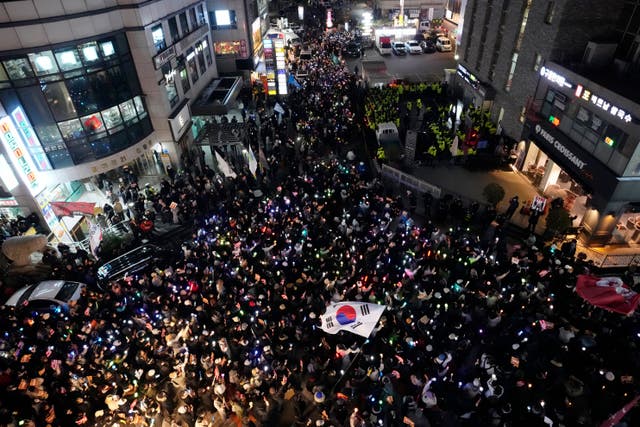South Korea’s national police chief detained over martial law
The top police officer for the capital Seoul has also been detained.

South Korea’s national police chief and top police officer for the capital Seoul have been detained for their roles in enforcing president Yoon Suk Yeol’s short-lived martial law decree.
Police said National Police Agency commissioner general Cho Ji Ho and Kim Bong-sik, head of Seoul’s metropolitan police agency of the capital, were being held at Seoul’s Namdaemun police station.
The development comes hours before the main liberal opposition Democratic Party submits a new motion to impeach Mr Yoon on the martial law introduction.
The party said it aims to put the motion on a floor vote on Saturday.

Earlier, Mr Yoon’s former defence minister Kim Yong Hyun was arrested after a Seoul court approved an arrest warrant for him on allegations of playing a key role in rebellion and committing abuse of power.
Mr Kim became the first person arrested over the December 3 martial law decree.
The police chiefs have been investigated for their roles in deploying forces to the National Assembly in an attempt to block politicians from entering the parliament to vote to lift Mr Yoon’s martial law decree.
The assembly was also encircled by heavily armed troops, which military commanders say were deployed on the orders of the former defence minister. Enough lawmakers eventually managed to enter a parliament chamber and unanimously rejected the decree, forcing the Cabinet to lift it before daybreak on December 4.
During a parliamentary hearing on Tuesday Kwak Jong-keun, commander of the Army Special Warfare Command whose troops were sent to parliament, testified that he received direct instructions from Kim Yong Hyun to obstruct lawmakers from entering the assembly’s main chamber.
Opposition parties and many experts say the martial law decree was unconstitutional.
They say a president is by law allowed to declare martial law only during “wartime, war-like situations or other comparable national emergency states” and South Korea was not in such a situation.
They argue that deploying troops to seal the National Assembly to suspend its political activities amounted to rebellion because the South Korean constitution does not allow a president to use the military to suspend parliament in any situation.
In his martial law announcement, the conservative Mr Yoon stressed a need to rebuild the country by eliminating “shameless North Korea followers and anti-state forces”, a reference to his liberal rivals who control parliament.
Since taking office in 2022, he has had near-constant friction with the main liberal opposition Democratic Party, which introduced motions to impeach some of his top officials and launched a political offensive over scandals involving Mr Yoon and his wife.
Mr Yoon avoided impeachment on Saturday after most governing party lawmakers boycotted a floor vote in the National Assembly.
If he is impeached, his presidential powers would be suspended until the Constitutional Court decides whether to restore them or remove him from office.
On Wednesday, North Korea’s state news agency for the first time reported about the political turmoil and street protests triggered by Mr Yoon’s martial law decree.
The report mostly attempted to explain the South Korean events although it used its typical abusive language like calling Mr Yoon “a traitor” and his military “gangsters”.
Many experts say North Korea is sensitive to the domestic spread of news on massive anti-government protests in foreign countries because its own people have no official access to international news and could be affected by such events.





